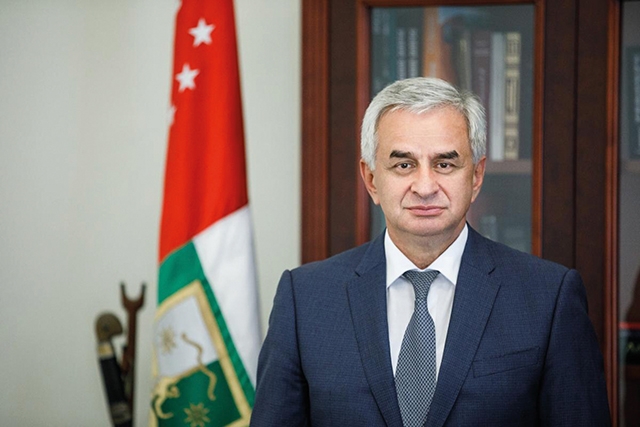The Abkhazia Revolution
Op-Ed
Occupied Abkhazia was once again hit by a revolutionary wave. It can be called “new” even though little time has passed since the previous one. The last, known as the Tangerine Revolution, happened almost five years ago, then also seeing the so called presidential palace stormed by crowds. This week the protesters were attacking the office of the previous revolution’s hero, Raul Khajimba. And while usually Abkhazian revolutions aren’t distinguished with much drama, this year's riot proved different.
More than any other words that usually dominate such events, in this case the rebels’ glossary was filled with the word “constitution”. In these days of revolution, the Abkhazian political elite protested the outcome of the so-called presidential elections held on September 8. Following the second round of elections, de facto president Raul Khajimba gained a victory over his competitor Alkhas Kvitsinia with a mere 1000 votes. However, he got only 47% of votes and not the required 50% + 1 vote. These figures served as ground for the ongoing protest.
Despite the fact that since September, Khajimba has worked hard to combat attacks from competitors, receiving congratulations from those who recognize his “position” and having an “inauguration,” on January 9 he was unable to handle the group of protesters that gathered against him and, just like his predecessor Alexandre Anqvab five years ago, he was forced to step down.
Another and a bigger novelty of the revolution was who the rebels were. The revolutionary avant-garde that knocked at Khajimba's door wasn’t led by unknown politicians, but by famous criminals. It is safe to say that Khajimba became the victim of criminals rather than political opponents.
Everything started on November 22 in the restaurant Sanremo in Sokhumi. On this day, two so-called thieves-in-law were killed. The Abkhazian crime circuit accused Khajimba’s security people of covering for the murderers. And it was the criminal world of Abkhazia that delivered the verdict to Khajimba on January 9. The fact that the revolution was led by criminals was clearly seen on the TV screens too, with Jemal Gamakharia noted “the heads of these events were not political parties, for example Kvitsinia, who lost the elections to Khajimba due to electoral fraud, they were the relatives of the murdered criminals, headed by Akhra Avidzba, who lives in Sochi and fights in Donetsk on the side of Russians and even has some awards for doing so. He is one of the ‘acclaimed’ representatives of the criminal world and for some time now has been making statements addressing Khajimba. Yesterday marked the united attack of these criminals and political powers against the residence of the de facto president: it was commanded not by politicians but personally by Akhra Avidzba.”
However, apart from the criminals, the riot did have its own political leader too, and it was the predecessor of Khajimba, Alexandre Anqvab. Not only in Sokhumi, but in Tbilisi too, people are convinced the revolutionary processes are backed by so-called “Iron Alika”.
“Alexandre Anqvab is behind the processes in Abkhazia. He was overthrown by Khajimba and when this happened, Russia stood behind the processes headed by Khajimba. Anqvab was a pro-Abkhazian politician and not pro-Russian. He did everything so that the law enforcement agencies and military bases wouldn’t feel free on the territory of Abkhazia; he caused many problems for them. When Khajimba signed an agreement with the Russian military bases that stated that Russian soldiers wouldn’t be held responsible for any crime and that Russian law enforcement institutions stood higher than that of Abkhazian, the criminal government started,” said former MP Paata Davitaia.
Although the revanche happened, it is still hard to understand what the actual reason was for removing Putin’s favorite Raul Khajimba from the political arena. Why would Russia need this, why was it necessary to get rid of him and bring in another “president”, especially if both parties are managed by Russia? When discussing this issue, in Sokhumi people talk about the rough policies of Khajibma, however if we take into consideration the Russian political taste, this argument doesn’t seem legit. Perhaps we should be looking for the answers to the “Abkhazian Revolution” in the blitz-interview with Sergey Shamba, the veteran politician who talked with Mtavari News just a few hours after Khajimba’s resignation.
Shamba called on Tbilisi and Sokhumi to start a dialogue, saying: “We can say that I was the leader of the battle against Georgia, but I am also the first who started talking about the need for dialogue, and the time has come for us to start thinking about our mutual future, in the sense that we are neighboring people.”
Following this announcement, it is quite clear Khajimba wouldn’t work for the Kremlin in negotiations with Tbilisi. The apartheidist politics of Khajimba in Gali wouldn’t not allow for such a dialogue. Apart from the “Gali Apartheid,” Khajimba was also against the opening of the Tbilisi-Sokhumi railway. Unlike him, Aslan Bzhania was quite loyal, and, apart from being connected with Georgians on a relatives basis, he agrees to give the Gali Georgians the right to vote in the elections. He also thinks that trains can move over the Enguri Bridge. In short, the Kremlin concludes that Aslan Bzhania will be the figure, who will be heard not only in Sokhumi, but in Tbilisi too. However, the general Sokhumi population has different ideas about Bzhania: they think that today Abkhazia is in a dead-end and is doomed to only observe how one group of people overthrows the government, then the other strikes back, and so it goes infinitely and forever.
By Zaza Jgarkava












